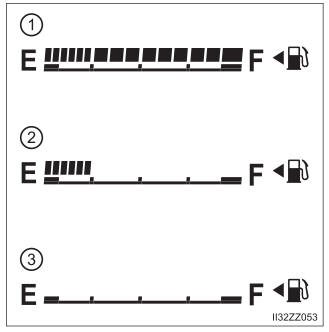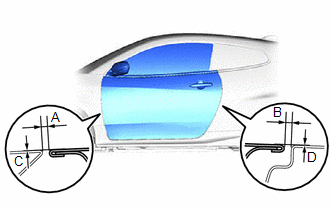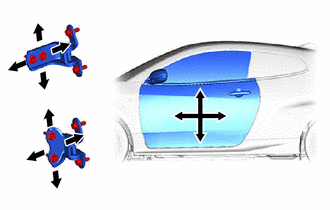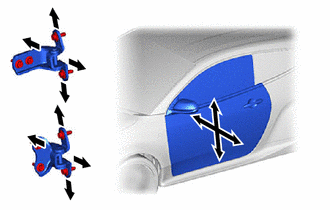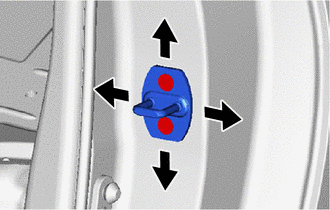Toyota Yaris: Front Door / Adjustment
ADJUSTMENT
CAUTION / NOTICE / HINT
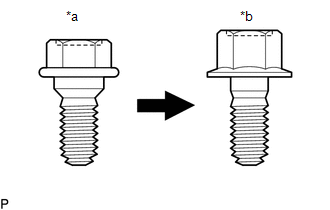
| *a | Centering Bolt |
| *b | Standard Bolt |
HINT:
- Use the same procedure for the LH side and RH side.
- The following procedure is for the LH side.
- Centering bolts are used to install the door hinges to the vehicle body and door. The door cannot be adjusted with the centering bolts installed. Substitute the centering bolts with standard bolts when making adjustments.
-
The specified torque for standard bolts is shown in the standard bolt chart.
Click here
.gif)
PROCEDURE
1. INSPECT FRONT DOOR PANEL SUB-ASSEMBLY
| (a) Check that the clearance measurements of areas "A" to "D" are within the standard ranges. Standard Clearance:
|
|
2. ADJUST FRONT DOOR PANEL SUB-ASSEMBLY
| (a) Using SST, loosen the 4 hinge bolts on the vehicle body and adjust the door position. SST: 09812-00010 |
|
(b) Tighten the 4 hinge bolts on the vehicle body after adjustment.
Torque:
26 N·m {265 kgf·cm, 19 ft·lbf}
| (c) Loosen the 4 hinge bolts on the door and adjust the door position. |
|
(d) Tighten the 4 hinge bolts on the door after adjustment.
Torque:
21 N·m {214 kgf·cm, 15 ft·lbf}
| (e) Using a T40 "TORX" socket wrench, slightly loosen the 2 striker mounting screws. |
|
(f) Using a brass bar and a hammer, hit the striker to adjust its position.
(g) Using a T40 "TORX" socket wrench, tighten the 2 striker mounting screws after adjustment.
Torque:
23 N·m {235 kgf·cm, 17 ft·lbf}
 Disassembly
Disassembly
DISASSEMBLY CAUTION / NOTICE / HINT The necessary procedures (adjustment, calibration, initialization, or registration) that must be performed after parts are removed and installed, or replaced during the front door removal/installation are shown below...
 Reassembly
Reassembly
REASSEMBLY CAUTION / NOTICE / HINT HINT:
Use the same procedure for the LH side and RH side.
The following procedure is for the LH side.
PROCEDURE 1...
Other information:
Toyota Yaris XP210 (2020-2026) Reapir and Service Manual: Diagnosis System
DIAGNOSIS SYSTEM NOTICE: The following communication bus check screen is provided only as an example. This screen differs from the actual screen for this vehicle. Description of "Communication Bus Check" Screen HINT: The ECUs and sensors that are normally connected to the CAN communication system are displayed on the GTS...
Toyota Yaris XP210 (2020-2026) Owner's Manual: If a Warning Light Turns On or Flashes
If any warning light turns on/flashes, take appropriate action for each light. There is no problem if the light turns off, however if the light does not turn off or turns on/flashes again, consult your Toyota dealer. The details for some warnings can be viewed on the center display...
Categories
- Manuals Home
- Toyota Yaris Owners Manual
- Toyota Yaris Service Manual
- Battery Monitor Module General Electrical Failure (P058A01)
- Diagnostic Trouble Code Chart
- How to use USB mode
- New on site
- Most important about car
Fuel Gauge
The fuel gauge shows approximately how much fuel is remaining in the tank when the ignition is switched ON. We recommend keeping the tank over 1/4 full.
